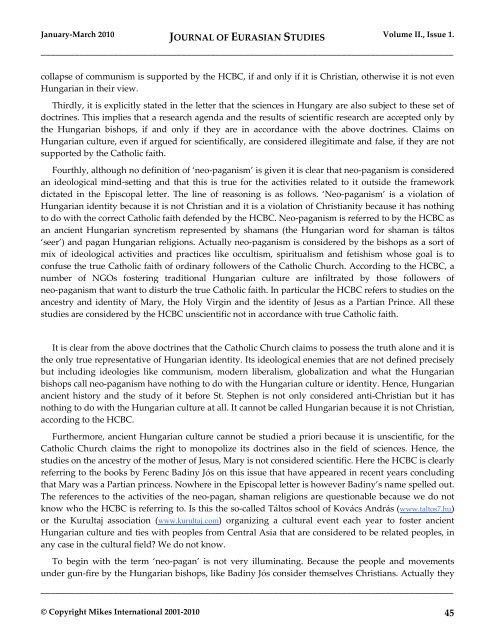EurasianStudies_0110..
EurasianStudies_0110..
EurasianStudies_0110..
You also want an ePaper? Increase the reach of your titles
YUMPU automatically turns print PDFs into web optimized ePapers that Google loves.
January-March 2010 JOURNAL OF EURASIAN STUDIES Volume II., Issue 1.<br />
_____________________________________________________________________________________<br />
collapse of communism is supported by the HCBC, if and only if it is Christian, otherwise it is not even<br />
Hungarian in their view.<br />
Thirdly, it is explicitly stated in the letter that the sciences in Hungary are also subject to these set of<br />
doctrines. This implies that a research agenda and the results of scientific research are accepted only by<br />
the Hungarian bishops, if and only if they are in accordance with the above doctrines. Claims on<br />
Hungarian culture, even if argued for scientifically, are considered illegitimate and false, if they are not<br />
supported by the Catholic faith.<br />
Fourthly, although no definition of ‘neo-paganism’ is given it is clear that neo-paganism is considered<br />
an ideological mind-setting and that this is true for the activities related to it outside the framework<br />
dictated in the Episcopal letter. The line of reasoning is as follows. ‘Neo-paganism’ is a violation of<br />
Hungarian identity because it is not Christian and it is a violation of Christianity because it has nothing<br />
to do with the correct Catholic faith defended by the HCBC. Neo-paganism is referred to by the HCBC as<br />
an ancient Hungarian syncretism represented by shamans (the Hungarian word for shaman is táltos<br />
‘seer’) and pagan Hungarian religions. Actually neo-paganism is considered by the bishops as a sort of<br />
mix of ideological activities and practices like occultism, spiritualism and fetishism whose goal is to<br />
confuse the true Catholic faith of ordinary followers of the Catholic Church. According to the HCBC, a<br />
number of NGOs fostering traditional Hungarian culture are infiltrated by those followers of<br />
neo-paganism that want to disturb the true Catholic faith. In particular the HCBC refers to studies on the<br />
ancestry and identity of Mary, the Holy Virgin and the identity of Jesus as a Partian Prince. All these<br />
studies are considered by the HCBC unscientific not in accordance with true Catholic faith.<br />
It is clear from the above doctrines that the Catholic Church claims to possess the truth alone and it is<br />
the only true representative of Hungarian identity. Its ideological enemies that are not defined precisely<br />
but including ideologies like communism, modern liberalism, globalization and what the Hungarian<br />
bishops call neo-paganism have nothing to do with the Hungarian culture or identity. Hence, Hungarian<br />
ancient history and the study of it before St. Stephen is not only considered anti-Christian but it has<br />
nothing to do with the Hungarian culture at all. It cannot be called Hungarian because it is not Christian,<br />
according to the HCBC.<br />
Furthermore, ancient Hungarian culture cannot be studied a priori because it is unscientific, for the<br />
Catholic Church claims the right to monopolize its doctrines also in the field of sciences. Hence, the<br />
studies on the ancestry of the mother of Jesus, Mary is not considered scientific. Here the HCBC is clearly<br />
referring to the books by Ferenc Badiny Jós on this issue that have appeared in recent years concluding<br />
that Mary was a Partian princess. Nowhere in the Episcopal letter is however Badiny’s name spelled out.<br />
The references to the activities of the neo-pagan, shaman religions are questionable because we do not<br />
know who the HCBC is referring to. Is this the so-called Táltos school of Kovács András (www.taltos7.hu)<br />
or the Kurultaj association (www.kurultaj.com) organizing a cultural event each year to foster ancient<br />
Hungarian culture and ties with peoples from Central Asia that are considered to be related peoples, in<br />
any case in the cultural field? We do not know.<br />
To begin with the term ‘neo-pagan’ is not very illuminating. Because the people and movements<br />
under gun-fire by the Hungarian bishops, like Badiny Jós consider themselves Christians. Actually they<br />
_____________________________________________________________________________________<br />
© Copyright Mikes International 2001-2010 45

















